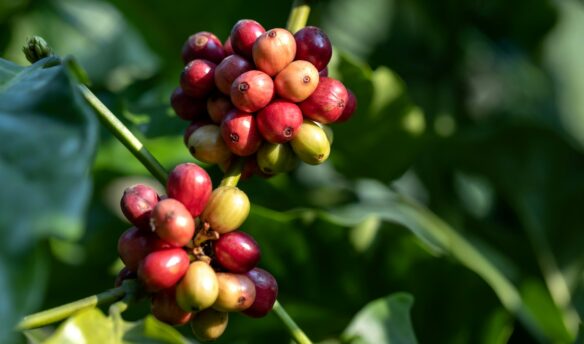How much caffeine is in that cappuccino? The answer may surprise you (it’s a lot). Plus, acquisitions come for green coffee, and adding milk to your morning brew could supercharge its health benefits.
‘Sucafina Acquires US Green Coffee Trader Sustainable Harvest’ – via Daily Coffee News
The recent trend of acquisitions in specialty coffee has come for green coffee traders. Roasters and cafe chains have been consolidating for several years: Peet’s Coffee & Tea bought Stumptown and Intelligentsia in 2015, Nestlé purchased a majority stake in Blue Bottle in 2017, Fairwave Holdings has acquired multiple coffee businesses throughout the Midwest—and now progressive coffee trading company Sustainable Harvest has been acquired by the North American arm of multinational trader Sucafina Group.
Founded by David Griswold in 1997, Sustainable Harvest is best known for developing a “relationship coffee” purchasing model centered around transparency and traceability. According to Daily Coffee News, Sustainable Harvest nurtures “long-term relationships with green coffee producer groups through investments, capacity-building and social sustainability initiatives,” as well as being involved in living income projects at origin.
Now, the trading company will fall under Sucafina Specialty, a newly unified brand featuring various Sucafina specialty-focused subsidiaries.
“Sustainable Harvest is rededicating itself to its core mission to support producers and roasters with traceable, transparent trading,” said Sucafina North America managing director Jordan Hooper. “With this acquisition, we are providing the stronger financial support they need to continue operating some of the most progressive sustainability initiatives in the industry, while maintaining their company independence and status as a B Corporation.”
Griswold, previously Sustainable Harvest’s CEO, “will transition to an innovation role with the global Sucafina Group,” according to Sucafina. Griswold isn’t quoted in the announcement—instead, Jorge Cuevas, continuing in his role as Chief Coffee Officer, says that Sustainable Harvest plans to continue innovating and challenging the traditional coffee trading model through traceability and transparency.
“Together with Sucafina, we will continue our commitment to serving coffee farmers and roasters,” Cuevas said. “The relationship coffee model, producer partners, and customers remain at the heart of all we do.”
‘Costa Cappuccinos Deliver Nearly Five Times As Much Caffeine As Starbucks Ones’ – via the Guardian
A study in the United Kingdom has found that cappuccinos from Costa Coffee contain almost five times as much caffeine as the equivalent drink from Starbucks.
A cappuccino from Costa provided 325mg of caffeine, whereas the Starbucks capp had just 66mg. Pret a Manger’s offering contained 180mg—for reference, a 250ml can of Red Bull has about 80mg. The US Food and Drug Administration puts the safe daily amount for healthy adults to consume at 400mg.
“I think coffee is still functionally about caffeine and I feel like for the world’s most popular psychoactive drug, most people have no idea how much they’re taking,” World Barista Champion and coffee expert James Hoffmann told the Guardian. “I’m not sure that’s a good thing for any sort of supplement that you might want to use.” Hoffmann himself conducted caffeine experiments and analysis on his Youtube channel.
The study, conducted by the research group Which?, looked primarily at espresso-based drins made with two shots of espresso—Costa Coffee’s cappuccino has three. The researchers also theorized that the type of coffee included in the espresso roasts could affect the caffeine content—robusta contains significantly more caffeine than arabica and is favored by many bigger coffee chains.
A Costa spokesperson said that the caffeine content of its drinks is displayed in-store and on their website, pointing out that “all Costa coffees can be enjoyed with decaf coffee and we offer a wide range of non-caffeinated drinks.”
Judging by interviews the Guardian conducted with people outside various chain cafes, most don’t know how much caffeine is in their coffee and that it can deviate wildly from shop to shop.
“I had no idea that there was that big a difference,” one person said. “I thought coffee was just coffee, but maybe I’ll start thinking about it now.”
More News
‘It Aerates, It Oxygenates, It’s The Chemex ChemAer’ – via Sprudge
‘Westrock Coffee Building $70 Million Distribution Center in Arkansas’ – via Daily Coffee News
‘Take The First-Ever Coffee Business Owner Salary Survey’ – via Fresh Cup Magazine
‘A Philly Cafe Stole $1,200 in Tips From Workers, the City Labor Department Found’ – via the Philadelphia Inquirer
‘Former COO of Juan Valdez US Subsidiary Gets 3-6 Years for Theft of $900K’ – via Daily Coffee News
‘Experts Examine Rising Fertilizer Prices’ – via Global Coffee Report
The Week in Coffee Unionizing
- A National Labor Relations Board (NLRB) judge ruled that Starbucks illegally threatened its workers during the unionization drive at its flagship Seattle roastery. The company violated federal labor law by telling workers it would be futile to join a union, threatening to reduce or end benefits, and prioritizing non-union stores for additional benefits. Starbucks said that its actions were consistent with workplace law.
- Another complaint was filed by the NLRB against Starbucks, alleging union busting by the company at two locations in Philadelphia. The complaint claims that store managers discouraged participation by reducing hours and wages and fired two workers for organizing. “[Starbucks has] been drastically cutting labor and not giving us hours that we need,” a shift supervisor said. “A lot of us are really unsure of how we’re paying our rent right now.”
- The NLRB’s general counsel Jennifer Aburzzo took the stage at a conference held by the National Restaurant Association’s legal arm to tell restaurant executives and union-avoidance lawyers that the NLRB was formed to “level the playing field between employers and workers.” Abruzzo warned the audience that if workers were fired for organizing, the NLRB would seek reinstatement, back pay, and even public apology letters. Lobbyists and lawyers at the conference were clearly worried about unionization drives at Starbucks and other companies while being quite clear-eyed about why unions are picking up speed. “How does Kentucky have a unionized [coffee shop]?” one lawyer asked. “The answer is because it’s a social issue. And it’s done by the employees, not by the unions.”
Is Coffee Good For You?
According to new research from Denmark, adding milk to your coffee could be extra good for you. Combining the protein in milk and coffee’s antioxidants makes immune cells twice as effective at combating inflammation—and it doesn’t just have to be cow’s milk, either.
Researchers from the University of Copenhagen experimented with two substances: proteins from milk and polyphenols from coffee. Polyphenols are antioxidants abundant in coffee that have many health-promoting benefits, such as anti-inflammatory, anti-cancer, and anti-diabetes properties.
For this study, published in the Journal of Agricultural and Food Chemistry, the team applied artificial inflammation to immune cells and then dosed the cells with polyphenols which had reacted with an amino acid, the building block of proteins. Other cells received only doses of polyphenols, and a control group got nothing.
The immune cells treated with a combination of polyphenols and amino acids were twice as effective at fighting inflammation.
“In the study, we show that as a polyphenol reacts with an amino acid, its inhibitory effect on inflammation in immune cells is enhanced,” said lead author Professor Marianne Nissen Lund. “As such, it is clearly imaginable that this cocktail could also have a beneficial effect on inflammation in humans.”
The researchers speculate that the effects could be apparent in other foods that combine polyphenols and protein. “I can imagine that something similar happens in, for example, a meat dish with vegetables or a smoothie, if you make sure to add some protein like milk or yogurt,” said Professor Nissen Lund.
Sprudge notes that some alternative milks, such as soy, contain similar protein content to dairy, “so your favorite coffee beverage needn’t have animal products to get the anti-inflammatory double whammy.”
Beyond the Headlines
‘The Possibility And Promise Of Community Supported Agriculture In Coffee’ by Marco Dregni
‘Let’s Talk About Coffee Certifications’ by Anne Mercer
‘Q&A: Intelligentsia Barista Union’ by Ashley Rodriguez
‘The Graveyard of Coffee Kickstarters’ by Fionn Pooler
















